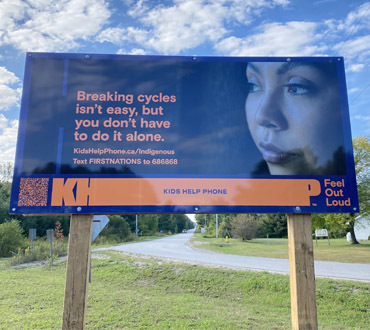Psychosis is something that may be hard to understand, especially with how it’s portrayed in the media and the stigma around it. If you think you may be experiencing psychosis, it can be helpful to know more about it and learn how and where you can get support with whatever’s on your mind. Here, Kids Help Phone shares just that — information on the definitions, signs and treatment options for psychosis so you can support yourself in the ways that work best for you.
What is psychosis?
People experiencing psychosis may have difficulty knowing what’s real and what’s not. They may see, hear, smell, taste and / or feel things that others can’t. Symptoms of psychosis often start when people are teens or adults. Some folks who experience psychosis may be diagnosed with a condition such as schizophrenia, bipolar disorder or something else.
Psychosis also affects people differently. Some folks may experience no episodes of psychosis, one episode, an episode from time to time or episodes often / all of the time. The amount of distress and interruption to daily life that psychosis brings also ranges from no / mild effects to effects that are more significant.
What factors can contribute to psychosis?
Psychosis can be a reaction to extreme stress, trauma, substance use, a spiritual experience, medical disorders and / or (less commonly) genetics. Only a health-care professional (e.g. a doctor, psychologist, psychiatrist, neurologist, etc.) can determine if what you’re experiencing is psychosis, another condition and / or something else by doing a thorough assessment.
What are the signs of psychosis?
A person who’s in an active state of psychosis (having an episode) may experience:
- anxiety
- delusions (e.g. distorted beliefs about yourself and the world, unusual thoughts, etc.)
- hallucinations (e.g. hearing voices, seeing things, feeling sensations, smelling things and / or experiencing tastes that others can’t)
- issues with sleep
- mood swings
- paranoia (e.g. feelings of being watched, talked about or plotted against, etc.)
- personality changes / changes in emotion (e.g. feeling “flat” or emotionless, having inappropriate reactions like laughing for no apparent reason, etc.)
- trouble with memory, concentration, problem solving and / or judgment
We want to let you know that these experiences don’t necessarily mean you’re having an episode of psychosis. They can also be a part of a mental disorder or condition, or a response to life in general. We’ve included them here to help with your understanding of what could be going on for you.
Is psychosis manageable?
Yes! Recovery from psychosis is possible and supports are available across Canada. Treatment can be helpful and effective, especially when you access resources early (i.e. when you start to notice the signs).
Although there are a variety of healing methods you can try, the most common option is a combination of medication and counselling. Medication can help you manage symptoms of psychosis. Counselling can help you understand psychosis and learn about ways to better support yourself when you’re experiencing it.
Are there any other ways to navigate psychosis?
The following strategies can be helpful to manage psychosis. You can try these tips on your own, or with folks who are supporting you, to work toward recovery.
#1:Surround yourself with a network of people who care about you and support your recovery. (As a starting point, you can connect with other youth who may have similar lived experiences on the Peer-to-Peer Community at Kids Help Phone.)
#2: Build a self-care routine to help you takecare of your mind and body. This can help support you with the amount of sleep, exercise, mindfulness and more that you need.
#3: Try an instant stress buster / grounding exercise to help you deal with difficult feelings in the moment. Finding ways to lower and manage stress can be very effective in managing psychosis.
#4: Keep track of how you’re feeling by taking notes in a journal. (You could even bring your journal with you if you decide to connect with a health-care professional.)
#5: Learn more about psychosis to understand it better. Here are some resources across Canada you can check out:
- Definition of Psychosis (BC Early Psychosis Intervention Program)
- Questioning Reality Self-check (Foundry BC)
- Psychosis (Canadian Mental Health Association)
If you think you may be experiencing psychosis, remember — you’re not alone. If you have questions about your mental health and well-being and / or how psychosis may be affecting your life, you can reach out to someone you trust. You can also find ways to get in touch with Kids Help Phone for support 24/7.













